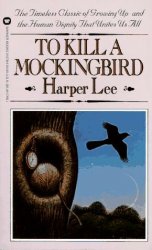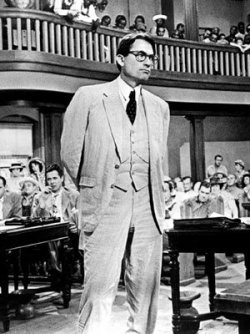- Sep 2, 2008
- 33,178
- 3,055
- 48
The first book for book of the month I figured had to mean something special. Since it will be fifty years since the release of this classic novel in July, what better way to celebrate literature by choosing a literary masterpiece.

To Kill A Mockingbird was written by Harper Lee and published in 1960. In 1961, it was chosen for the Pulitzer Prize. The book has many themes that still resonate with us today in 2010 America. Which is what helps make this book such a timeless classic. Themes ranging from race, class, to gender, to poverty, and of course law itself with several other themes as well.
Most of us who have read the book have no doubtingly seen Atticus Finch be brought to life on the big screen by legendary actor Gregory Peck.

There is no doubt as to why in 2003, the AFI named Atticus Finch as the greatest movie hero of 20th century. Many would argue, the greatest literary hero as well.
Some of my favorite quotes from the novel:
So we'll be discussing this book all month here at USMB for the very least. If you've read the book, feel free to join in! If not, pick it up and you won't regret reading it.
If you have any books that you would like to recommend to be read for the month of June, other months, or discuss other books in general, feel free to post here:
http://www.usmessageboard.com/general-discussion/118911-usmb-book-club.html

To Kill A Mockingbird was written by Harper Lee and published in 1960. In 1961, it was chosen for the Pulitzer Prize. The book has many themes that still resonate with us today in 2010 America. Which is what helps make this book such a timeless classic. Themes ranging from race, class, to gender, to poverty, and of course law itself with several other themes as well.
Most of us who have read the book have no doubtingly seen Atticus Finch be brought to life on the big screen by legendary actor Gregory Peck.

There is no doubt as to why in 2003, the AFI named Atticus Finch as the greatest movie hero of 20th century. Many would argue, the greatest literary hero as well.
Some of my favorite quotes from the novel:
"You never really understand a person until you consider things from his point of view - until you climb into his skin and walk around in it."
"There's a lot of ugly things in this world, son. I wish I could keep 'em all away from you. That's never possible."
"I wanted you to see what real courage is, instead of getting the idea that courage is a man with a gun in his hand. It's when you know you're licked before you begin but you begin anyway and you see it through no matter what. You rarely win, but sometimes you do."
"They're certainly entitled to think that, and they're entitled to full respect for their opinions, but before I can live with other folks I've got to live with myself. The one thing that doesn't abide by majority rule is a person's conscience."
So we'll be discussing this book all month here at USMB for the very least. If you've read the book, feel free to join in! If not, pick it up and you won't regret reading it.
If you have any books that you would like to recommend to be read for the month of June, other months, or discuss other books in general, feel free to post here:
http://www.usmessageboard.com/general-discussion/118911-usmb-book-club.html

